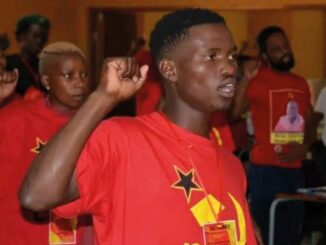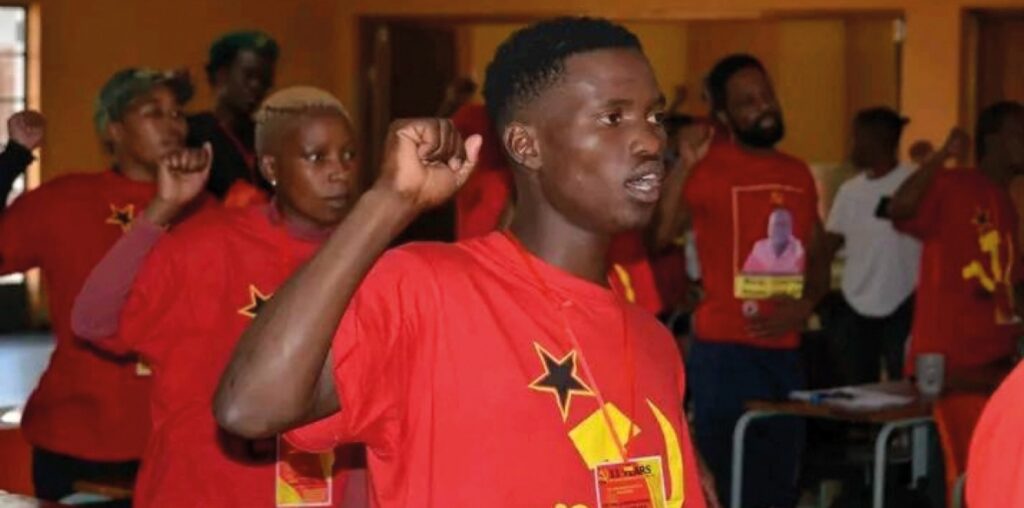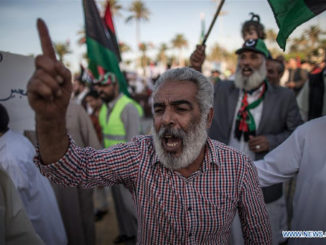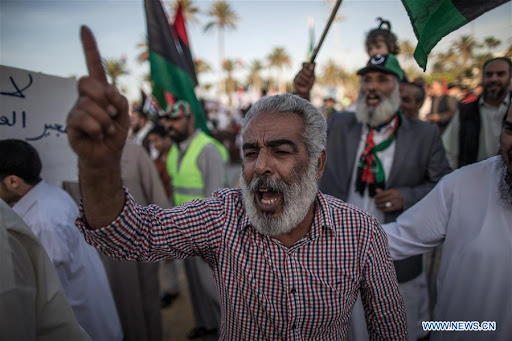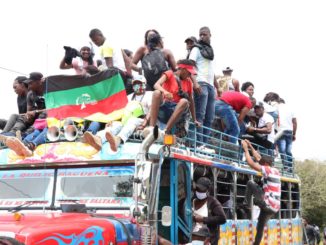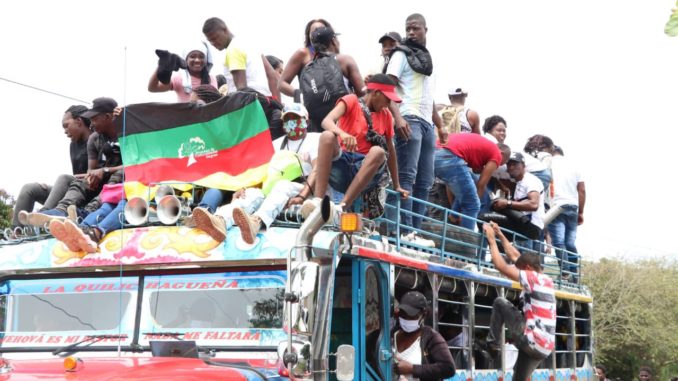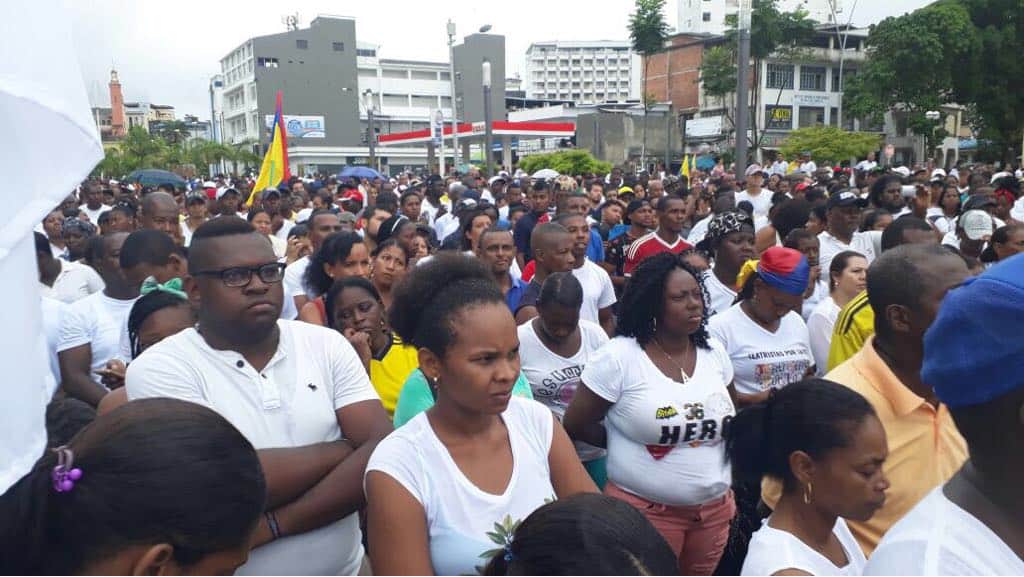
CALÍ, Colombia—Observers of the first-round presidential elections in Colombia shared with Toward Freedom irregularities they encountered in Buenaventura, a predominantly Afro-descendant city on the Pacific coast. This comes as it appears a left-wing candidate who faces death threats is surging in a recent poll against his social-media-savvy competitor.
With a population that is more than 90 percent Afro-descendant, Buenaventura voters appeared at polls with pride and joy to vote for an Afro-descendant woman whose vision matched theirs. That woman is Francia Márquez, the vice-presidential running mate of Gustavo Petro, the Pacto Histórico coalition presidential candidate.
“One man was at least 90 years old. He said he walked over a mile to vote. Then he had to walk up two flights of stairs with a cane,” said Janvieve Williams Comrie, founder and executive director of AfroResistance, a group that advocates for Afro-descendant women and girls in the Americas. AfroResistance organized the largest-ever observer delegation in Colombia and the only one centering Afro-descendant women. “But the fact he had to… is not only an act of resistance, but also an act of joy.”
The left-wing Gustavo-Márquez ticket garnered 78 percent of votes in Buenaventura. Aside from witnessing the Afro-descendant population’s excitement in voting for a radical Afro-descendant woman, election observers founded several irregularities in this predominantly Afro-descendant city. In 2017, a 22-day civil strike led by the Afro-descendant population in Buenaventura shut down the country’s main port on the Pacific Ocean.
Voter turnout was low—only 40 percent.
“Most poll workers far outnumbered the voters,” said Charisse Burden-Stelly, a professor at Carleton College and co-coordinator of the Black Alliance for Peace’s Research and Political Education Team who observed on the AfroResistance delegation. Burden-Stelly also said a locally based observer explained that voting lines usually wrap around blocks. But this year, paramilitary groups issued threats to the Buenaventura populace, warning against voting. Plus, the large police and military presence at polls compounded the threat.
Comrie said one member of the military threatened their group.
“His firearm was resting on one of our delegates. He was that close to us,” Comrie said. “Then he asked us for our name[s]. He wanted to know why we were there, even though we had explained beforehand we were part of this international observation delegation.”
Between threats and voter intimidation, Colombians have been quiet about who they are voting for. Charo Mina Rojas, a member of @renacientes, spoke in Calí about the challenges of voting in #Colombia this year. pic.twitter.com/3xr6Pn3Cp6
— Toward Freedom (@TowardFreedom) June 1, 2022
Buenaventura in particular is known for “chop houses,” buildings where paramilitaries cut adversaries’ bodies alive. The cries emanating from those buildings are designed to warn the public not to cross these groups, some of which have helped the production and flow of illicit drugs.
Burden-Stelly also noted that although vote results were announced at 5 p.m. in Buenaventura, the group of observers witnessed piles of bags containing uncounted ballots. This, in a city where observers noticed a disparity in biometric machines to validate voter identification cards.
Securing Voter Rights
Voting polls were supposed to contain literature explaining how the rights of people with disabilities and transgender people would be protected while voting.
However, a school used as a polling site had no cooling system or any way for people with mobility issues to climb stairs. But this location did have biometric machines. “It didn’t map directly onto resources, but that tended to be the trend,” Burden-Stelly said of the general lack of machines in poor neighborhoods.
“The math doesn’t add up properly,” Comrie said. “I understand communities are poor, but it’s 2022. What is also not adequate enough in these communities is that school was just raw. The classroom was in a little tin building, with no ventilation and it was so incredibly hot as we moved to the top floor.” Comrie further asked what elected officials were doing to secure human rights.
However, observers were proud to be able to support a transgender woman vote. The name on her identification card was not the same as the name she presented at the poll, so she was rejected. “The trans woman was ready to walk away,” Burden-Stelly said. But observers stepped in. That is why Comrie said AfroResistance’s presence of 29 observers was significant.
Meanwhile, observer badges were reportedly confiscated from Pacto Histórico observers at a polling site in Buenaventura. According to what observers heard, police also had detained those coalition representatives. Colombia’s National Electoral Council and Pacto Histórico did not reply to Toward Freedom‘s inquiries into the matter. Meanwhile, the Petro-Márquez campaign’s press team said they were unaware of this incident.
‘A Hug for Petro’
Petro has 44.9 percent support while millionaire Rodolfo Hernández has 41 percent support, a survey found.
While centrist and right-wing forces converge against Petro, and as the Biden administration attacks left-wing governments this week at the U.S. government-hosted Summit of the Americas in Los Angeles, Mexican President Andrés Manuel López Obrador said he wanted to send a hug to Petro.
“Why a hug? Because he is facing a dirty war of the most cowardly and undignified kind, everything we suffered in Mexico,” López said. “All the conservatives are united, unethically.”
Julie Varughese is editor of Toward Freedom. She recently reported on Colombia’s presidential elections here, here and here.

